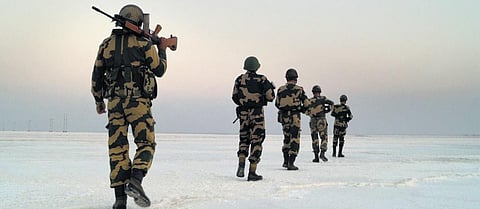

WASHINGTON: The American intelligence community on Wednesday told lawmakers that it apprehends increased tension between India and Pakistan and India and China with the possibility of a conflict between them.
According to a collective assessment report titled "Annual threat assessment of the US Intelligence Community," the relationship between India and China will not only be stained but also faces the elevated risk of "armed confrontation" despite the ongoing talks between the Asian giants.
The Report, assessing the Potential interstate conflict, mentions, "While India and China have engaged in bilateral border talks and resolved border points, relations will remain strained in the wake of the countries’ lethal clash in 2020, the most serious in decades."
It was in May 2020, a bloody conflict erupted between China's People's Liberation Army (PLA) and the Indian Army in Eastern Ladakh which had led to standoffs at multiple points. Subsequently, the two countries deployed more than 50, 000 soldiers on each side of the Line of Actual Control, with all equipment, arms and gear.
Assessing this dense deployment, the report says, "The expanded military postures by both India and China along the disputed border elevate the risk of armed confrontation between two nuclear powers that might involve direct threats to U.S. persons and interests, and calls for U.S. intervention."
Previous standoffs have demonstrated that persistent low-level friction on the Line of Actual Control (LAC) has the potential to escalate swiftly, the report says.
There has been disengagement at multiple points but standoffs in Demchok and Depsang continue. Also, the troops may have shifted away from the LAC but they are deployed in the vicinity. Also, both sides have developed proper habitats for the troops supported well by logistics lines.
Both sides continue to engage diplomatically and there are regular core commander-level talks between the two countries to resolve the issues.
Coming to the assessment of the ongoing relationship between India and Pakistan the Report says, "Crises between India and Pakistan are of particular concern because of the risk of an escalatory cycle between two nuclear-armed states."
The report adds, "New Delhi and Islamabad probably are inclined to reinforce the current calm in their relationship following both sides’ renewal of a cease-fire along the Line of Control in early 2021."
It was in 2021 that the Director Generals of Military Operations of the two countries have reiterated to strictly follow the ceasefire agreement which the senior Indian military commanders have repeatedly to have succeeded.
The report assesses the likelihood of a response "with military force" from the Indian side.
"However, Pakistan has a long history of supporting anti-India militant groups, and under the leadership of Prime Minister Narendra Modi, India is more likely than in the past to respond with military force to perceived or real Pakistani provocations."
The report adds, "Each side’s perception of heightened tensions raises the risk of conflict, with violent unrest in Kashmir or a militant attack in India being potential flashpoints."